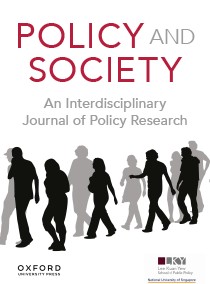变化是不可避免的,质量是可选的,环境是重要的:影响最优政策咨询系统发展的动力
IF 6.1
1区 社会学
Q1 POLITICAL SCIENCE
引用次数: 0
摘要
政策咨询系统(PAS)文献的发展表明,为内部公共服务行为体指定关键作用的传统模式已经让位于在咨询提供中纳入更多样化的外部非政府行为体。这反映在持续的政治化和外部化趋势如何影响PAS组织和行动者的影响力,导致更复杂的国家PAS结构和功能。考绩制度在结构和逻辑上的这种明显的混杂性对确保有关和高质量的咨询内容以及有效管理其供应和传播提出了挑战。本文利用Craft和Howlett关于政策建议内容特征和提供政策建议的行为者类型的模型来观察不同政治行政背景下PAS适应和变化动态的影响。在短期/反应性(例如,纯粹的政治或危机咨询)和长期/预见性(例如,协议和常规指导,循证咨询)的条件下,不同类型的咨询的存在是一个有用的标准,用于调查在威斯敏斯特和非威斯敏斯特环境中如何应用良好的治理标准和开放性来制定高质量的政策咨询内容。本文章由计算机程序翻译,如有差异,请以英文原文为准。
Change is inevitable, quality is optional, and context matters: dynamics influencing the development of an optimal policy advisory system
Developments in the policy advisory systems (PAS) literature demonstrate how the traditional models designating key roles for internal public service actors have given way to include a greater diversity of external nongovernmental actors in advice provision. This is reflected in how sustained politicization and externalization trends impact PAS organization and actors’ influence, resulting in a more complex national PAS architecture and functioning. This pronounced hybridity of PAS, both in structure and logic, presents challenges for ensuring relevant and quality advisory content and managing its supply and dissemination effectively. In this article, Craft and Howlett’s model on features of policy advice content and the types of actors supplying it is used to observe the implications of PAS adaptation and change dynamics across different political-administrative contexts. The presence of different types of advice under the conditions of short-term/reactive (e.g., purely political or crisis advice) and long-term/anticipatory (e.g., protocol and routine steering, evidence-based advice) is a useful rubric for surveying how good governance standards and openness have been applied in developing quality policy advice content in both Westminster and non-Westminster contexts.
求助全文
通过发布文献求助,成功后即可免费获取论文全文。
去求助
来源期刊

Policy and Society
Multiple-
CiteScore
18.00
自引率
6.50%
发文量
43
审稿时长
30 weeks
期刊介绍:
Policy and Society is a prominent international open-access journal publishing peer-reviewed research on critical issues in policy theory and practice across local, national, and international levels. The journal seeks to comprehend the origin, functioning, and implications of policies within broader political, social, and economic contexts. It publishes themed issues regularly and, starting in 2023, will also feature non-themed individual submissions.
 求助内容:
求助内容: 应助结果提醒方式:
应助结果提醒方式:


